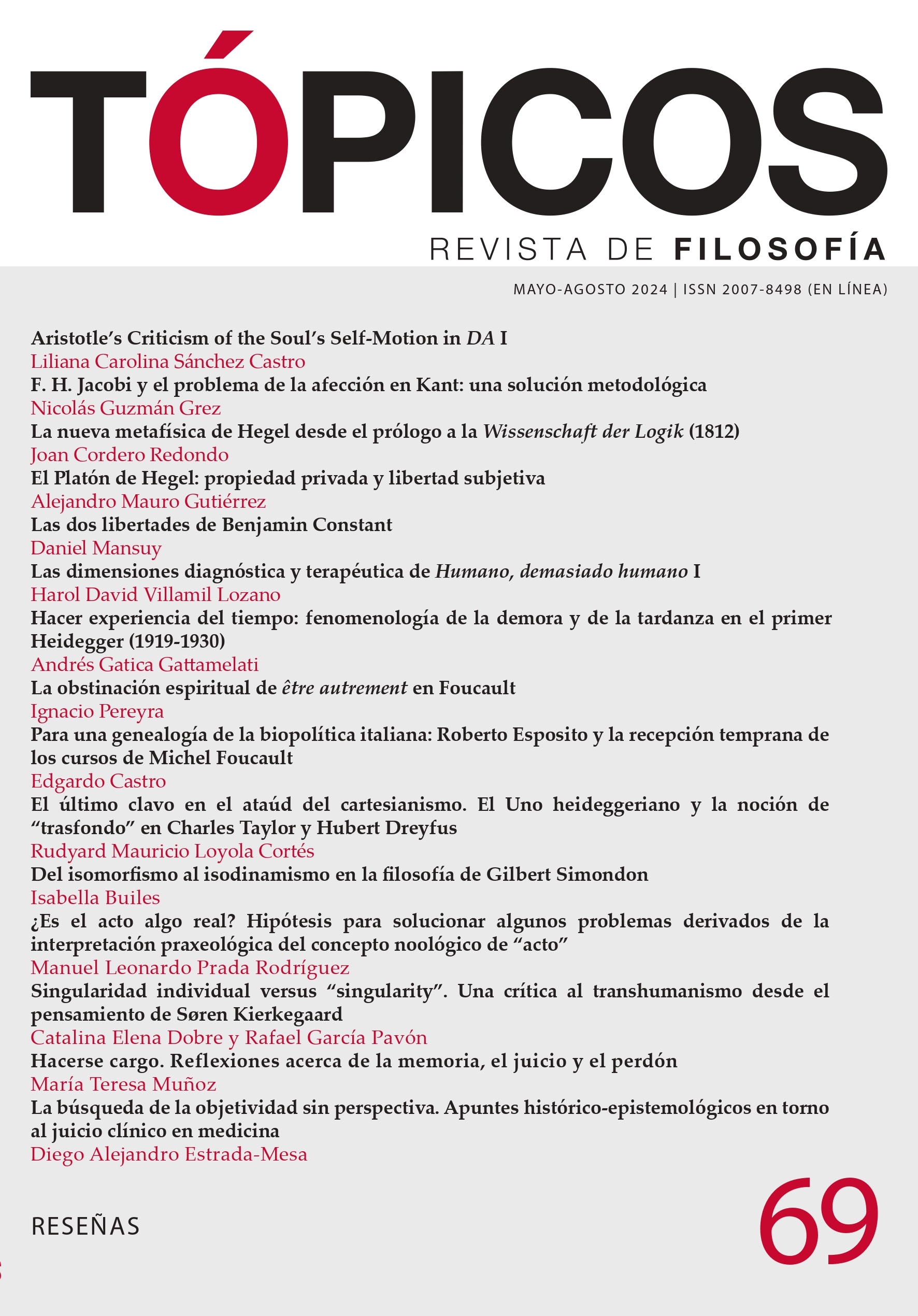Publicado 2024-04-04
Palabras clave
- Roberto Esposito,
- Foucault,
- gubernamentalidad,
- biopolítica,
- maquiavelismo
- antimaquiavelismo ...Más
Derechos de autor 2024 Tópicos, Revista de Filosofía

Esta obra está bajo una licencia internacional Creative Commons Atribución-NoComercial-SinDerivadas 4.0.
Cómo citar
Resumen
Este artículo se ocupa de la recepción de la noción foucaultiana de “gubernamentalidad” en el pensamiento de Roberto Esposito a partir de la traducción al italiano de las lecciones de Foucault de los años 1977 y 1978 en el Collège de France. En primer lugar, se exponen los diferentes contextos de recepción de estas lecciones, en particular en el ámbito anglosajón de los estudios sobre la gubernamentalidad y en el de la crisis del marxismo italiano de finales de los setenta. En segundo lugar, se analiza la posición de Foucault en sus cursos de estos años desde la perspectiva de la oposición entre maquiavelismo y antimaquiavelismo en vista, precisamente, de la recepción italiana. Por último, se aborda la recepción de la noción de “gubernamentalidad” por parte de Roberto Esposito en su obra de 1980, La politica e la storia. El artículo muestra la importancia de esta recepción temprana de las lecciones de Foucault respecto de la formación de la corriente biopolítica italiana y, sobre todo, sus especificidades.
Referencias
- Agamben, G. (1995). Homo sacer. Il potere sovrano e la nuda vita. Einaudi.
- Agamben, G. (2007). Il Regno e la Gloria. Per una genealogia teologica dell’economia e del governo. Bollati Boringhieri.
- Althusser, L. (2009). Machiavel et nous. Tallandier.
- Audier, S. (2015). Penser le «néolibéralisme». Le moment néolibéral, Foucault et la crise du socialisme. Le Bord de l’Eau.
- Attal, F. (2013). Histoire des intellectuels italiens au XXe siècle. Prophètes, philosophes et experts. Les Belles lettres.
- Burchell, G., Gordon, C. y Miller, P. (1991). The Foucault Effect: Studies in Governmentality. University of Chicago Press-Harvester Wheatsheaf.
- Cacciari, M. (1976). Krisis. Saggio sulla crisi del pensiero negativo da Nietzsche a Wittgenstein. Feltrinelli.
- Christofferson, M.-S. (2004). French Intellectuals against the Left: The Antitotalitarian Movement of the 1970s. Berghahn Books.
- Del Vento, C. y Fournel, J.-L. (2007). L’édition des cours et les «pistes» de Michel Foucault. Entretiens avec Mauro Bertani, Alessandro Fontana et Michel Senellart. Laboratoire italien, 7, 173-198. DOI: https://doi.org/10.4000/laboratoireitalien.144.
- Donzelot, J. y Gordon, C. (2005). Comment gouverner les sociétés libérales ? L’effet Foucault dans le monde anglo-saxon. Esprit, 319(11), 82-95.
- Esposito, R. (1980). La politica e la storia. Machiavelli e Vico. Liguori.
- Esposito, R. (1984). Ordine e conflitto. Machiavelli e a letteratura politica del Rinascimento italiano. Liguori.
- Esposito, R. (2002). Immunitas. Protezione e negazione della vita. Einaudi.
- Esposito, R. ([1981] 2007). Forma e scissione in Machiavelli. En D. Gentili (ed.), La crisi del politico. Antologia de “Il Centauro” (1981-1986). (pp. 41-72). Guida.
- Esposito, R. (2010). Pensiero vivente. Origine e attualità della filosofia italiana. Einaudi.
- Foucault, M. (1966). Les mots et les choses. Gallimard.
- Foucault, M. (1969). L’archéologie du savoir. Gallimard.
- Foucault, M. (1971). L’ordre du discours. Gallimard.
- Foucault, M. (1975). Surveiller et punir. Naissance de la prison. Gallimard.
- Foucault, M. (1976). La volonté de savoir. Histoire de la sexualité. 1. Gallimard.
- Foucault, M. (1977). Microfisica del potere. Interventi politici. A. Fontana y P. Pasquino (eds.). G. Procacci y P. Pasquino (trads.). Einaudi.
- Foucault, M. (1978a). La governamenlalità. P. Pasquino (trad.). Aut-Aut,167-168, 12-29.
- Foucault, M. (1978b). Microfísica del poder. J. Varela y F. Álvarez-Uría (trads.). Ediciones de la Piqueta.
- Foucault, M. (1979). Governmentality. Ideology & Consciousness, 6, 5-21.
- Foucault, M. (1986). La gouvernementalité. Actes, 54, 7-15.
- Foucault, M. (1994). Dits et écrits. Cuatro volúmenes. Gallimard.
- Foucault, M. (1997). “Il faut défendre la société”. Cours au Collège de France. 1976. Gallimard-Seuil.
- Foucault, M. (2004a). Sécurité, territoire, population. Cours au Collège de France. 1977-1978. Gallimard-Seuil.
- Foucault, M. (2004b). Naissance de la biopolitique. Cours au Collège de France. 1978-1979. Gallimard-Seuil.
- Foucault, M. (2014). Subjectivité et vérité. Cours au Collège de France 1980-1981. Gallimard-Seuil.
- Foucault, M. (2022). Microfísica del poder H. Pons (trad.). Siglo XXI.
- Gentili, D. (2007). La crisi del politico. Antologia de “Il Centauro” (1981-1986). Guida.
- Gentili, D. (2012). Italian Theory. Dall’operaismo alla biopolitica. Il Mulino.
- Gentili, D. (2018). Crisi come arte di governo. Quodlibet.
- Horkheimer, M. (1930). Anfänge der bürgerlichen Geschichtsphilosophie. Kohlhammer.
- Meinecke, F. (1924). Die Idee der Staatsräson in der neueren Geschichte. R. Oldenbourg.
- Meinecke, F. (1936). Die Entstehung des Historismus. R. Oldenbourg.
- Piazzi, A., Segatori, M. y Tronti, M. (1977). Stato e rivoluzione in Inghilterra. Teoria e pratica della prima rivoluzione inglese. Il Saggiatore.
- Senellart, M. (2001). Machiavel à l’épreuve de la gouvernementalité. En G. Sfez y M. Senellart (eds.), L’enjeu Machiavel. (pp. 211-227). PUF.
- Senellart, M. (2015). Machiavel dans la perspective de la gouvernementalité. En R. Descendre y J. Fournel (eds.), Langages, politique, histoire. Avec Jean-Claude Zancarini. ENS Éditions. DOI: https://doi.org/10.4000/books.enseditions.5262.
- Solzhenitsyn, A. (1974). Archipiélago Gulag. 1918 1956. Ensayo de investigación literaria. L. R. Martínez (trad.). Plaza & Janes.
- Spaventa, B. (1860). La filosofia di Kant e la sua relazione colla filosofia italiana. Unione Tipografico-Editrice Torinese.
- Thuau, É. (1966). Raison d’État et pensée politique à l’époque de Richelieu. Armand Colin.





